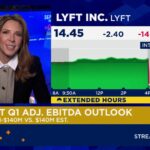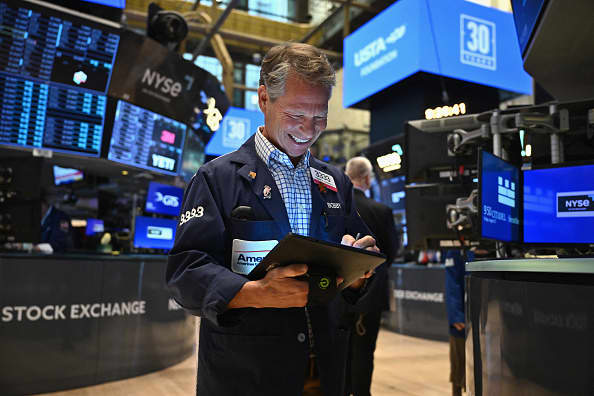
It’s been a stellar month for the U.S. stock market, driven largely by easing monetary policy. Since the Club’s last Monthly Meeting, investors have celebrated the Federal Reserve’s pivot to its rate-cutting era. The U.S. central bank announced its first interest rate reduction in more than four years on Sept. 18, sending stock benchmarks to all-time highs. Most recently, the S & P 500 and Dow Jones Industrial Average both closed at record levels Monday. The S & P and Dow are up 4.5% and 4%, respectively, since the Sept. 12 monthly gathering. We’ve taken advantage of the market highs. The rate cutting news sent Meta Platforms , Alphabet and Danaher higher, encouraging us to offload shares of each on Sept. 26 in an overbought market. The Club also exited Procter & Gamble on Oct. 8. The reasoning: There’s less need to hold onto traditional defensive names like consumer staples while the Fed is embarking on an easing cycle. We did hold onto our rate-sensitive names like Wells Fargo and Morgan Stanley , which were among the best performers since the last Monthly Meeting. (We sold a little of the latter, more details below). The improving macro backdrop on the back of loosening policy bodes well for Meta Platforms too. Meanwhile, continued investments around generative artificial intelligence boosted shares of Salesforce and Eaton , which rounded out the top five. Here’s a breakdown of what drove gains in each of these five Club stocks since the market close of the September meeting through Tuesday’s close ahead of Wednesday’s October Monthly meeting at noon ET . 1. Wells Fargo: 22% This stock got a boost after the Fed enacted its first rate cut in mid-September, which lifted the entire financials sector. That’s because lower borrowing costs can benefit Wells Fargo by stabilizing its interest-based revenue streams. The firm’s net interest income (NII) took hits during the higher-for-long rate environment as customers sought to park cash in higher-yielding alternatives. It weighed on the bank’s loan growth as well. Wells Fargo’s solid quarterly earnings release on Oct. 11, and subsequent positive Wall Street commentary in the sessions that followed, sent the stock to multi-year highs. We hiked our price target to $66 apiece from $61 on earnings, and reiterated our buy-equivalent 1 rating on the stock. 2. Morgan Stanley: 16.2% Following the Fed’s decision, shares advanced as investors became more optimistic about a soft landing for the U.S. economy. Morgan Stanley benefits from lower rates — and, in turn, a better economy — because it can usher in more Wall Street dealmaking such as initial public offerings and mergers and acquisitions. That’s great news for the turnaround story in Morgan Stanley’s crucial investment banking division. To be sure, we made a small sale of the financial stock on Sept. 19 after its post-Fed pop. That’s because the Club has been debating exiting Morgan Stanley altogether for a potentially better investment banking rebound play like Goldman Sachs. However, we hope to get more clarity on Morgan Stanley’s standing in the portfolio when the firm reports quarterly results Wednesday. 3. Salesforce: 13.8% What caused the double-digit percentage jump in this tech stock? Two words: artificial intelligence. Salesforce hosted its Dreamforce Conference last month, where CEO Marc Benioff touted Agentforce, the company’s AI-enhanced chatbot tools. Shares had their biggest single-day jump in nearly four months, at 5.4%, on Sept. 19 after management detailed more about the flagship offering. A flurry of positive Wall Street chatter followed suit, extending the run even further. Piper Sandler upgraded the stock to a buy rating from neutral on Sept. 24. A week later, Northland Capital Markets also raised its rating on the software maker to a buy-equivalent rating from hold. 4. Meta Platforms: 11.5% The social media giant trended higher after investors saw the unveiling of the Quest 3S , the latest VR headset from the company at the social media giants annual developer conference on Sept. 25. The stock continued to climb on positive signs for the company’s advertising business, which prompted UBS to hike the stock’s price target to $690 apiece from $635. Guggenheim raised the company’s price target to $665 from $600. Analysts at the firm argued that Meta was the top destination for incremental ad dollars, citing recent channel checks. 5. Eaton: 11.3% This industrial name doesn’t have one single catalyst for its outperformance. But increasing data center investments on the back of increased AI adoption, accompanied by upbeat Wall Street research, likely contributed to the stock’s climb. On Sept. 16, Citigroup initiated coverage of Eaton as a buy, sending shares higher. Analysts argued that Eaton will continue to benefit from the buildout of data center facilities, which will in turn increase demand for the company’s power management solutions. Morgan Stanley reiterated its buy-equivalent rating on Oct. 10, arguing that Eaton has a positive setup into earnings season. That same session, analysts at JPMorgan maintained their buy rating on Eaton and increased its price target to $349 apiece from $325. The stock traded near all-time highs on Tuesday. (See here for a full list of the stocks in Jim Cramer’s Charitable Trust.) As a subscriber to the CNBC Investing Club with Jim Cramer, you will receive a trade alert before Jim makes a trade. Jim waits 45 minutes after sending a trade alert before buying or selling a stock in his charitable trust’s portfolio. If Jim has talked about a stock on CNBC TV, he waits 72 hours after issuing the trade alert before executing the trade. THE ABOVE INVESTING CLUB INFORMATION IS SUBJECT TO OUR TERMS AND CONDITIONS AND PRIVACY POLICY , TOGETHER WITH OUR DISCLAIMER . NO FIDUCIARY OBLIGATION OR DUTY EXISTS, OR IS CREATED, BY VIRTUE OF YOUR RECEIPT OF ANY INFORMATION PROVIDED IN CONNECTION WITH THE INVESTING CLUB. NO SPECIFIC OUTCOME OR PROFIT IS GUARANTEED.
Traders work on the floor of the New York Stock Exchange.
Angela Weiss | AFP | Getty Images
It’s been a stellar month for the U.S. stock market, driven largely by easing monetary policy.














